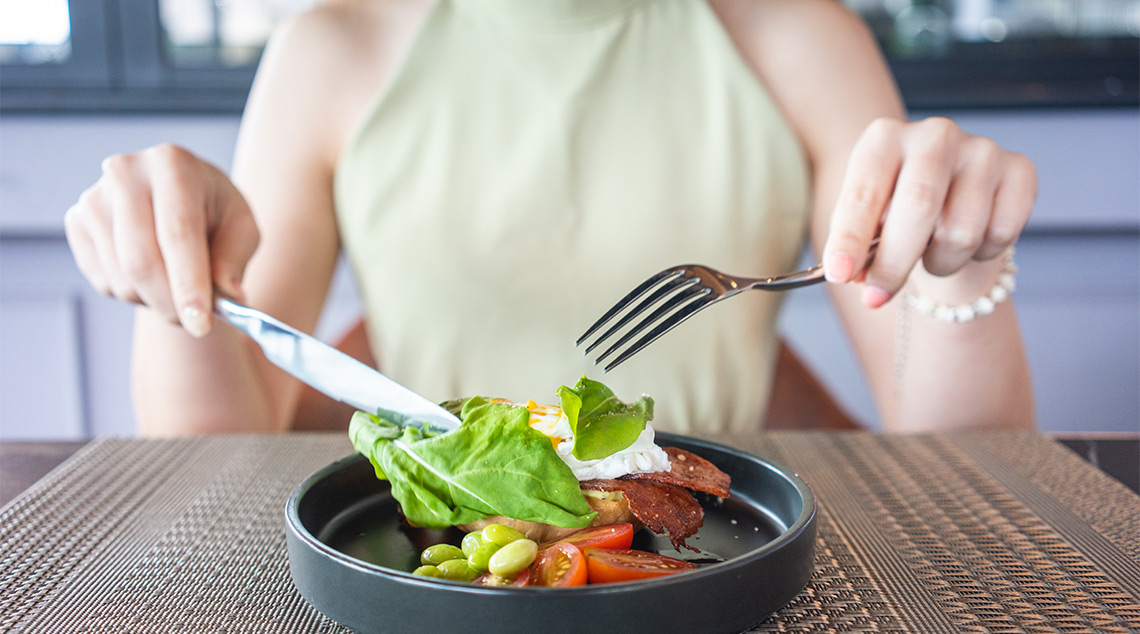Why so many women are not getting enough protein
Protein is essential for a healthy body, but many women are shying away from eating enough of it. So, just how much do you really need?
Sometimes, nutrition advice is straightforward: Drink plenty of water. Eat five serves of veggies a day.
But when it comes to protein, things get trickier – consuming the right amount of this macronutrient is a little harder than drinking eight cups of water and eating your greens every day.
Why is protein important?
Protein is essential to good health.
It helps your body grow and repair cells, and keeps it functioning properly, regulating vital biochemical reactions and maintaining a healthy immune system.
The building blocks of protein are called amino acids.
While your body can make some of these, there are nine amino acids – known as essential amino acids – that you need to get through your diet.
Are you getting enough protein?
Nearly half of 1000 Australian women surveyed by MyFitnessPal said they were not getting enough of this vital nutrient, and more than three quarters said they were unsure of how much they needed.
Senior lecturer in nutrition at the University of South Australia Dr Alison Hill says guidelines for protein intake “differ by your age, gender, what stage of life you’re in, and the level of exercise you do”.
Protein requirements are also based on your weight.
In general, Dr Hill says an adult female needs 0.75g of protein per kilogram of body weight per day – so a 65kg woman would require about 48g of protein.
For men, that number is a bit higher, around 0.84g per kilogram of body weight.
“They have more muscle mass, bone tissue, blood volume, skin – protein is used to support these structural components, as well as functions of the body,” Dr Hill explains.
If you’re pregnant, your protein intake needs go up too.
That’s because protein is needed to support the large increase in blood volume during pregnancy, as well as foetal growth and development.
And if you’re breastfeeding, you’ll need more protein to help maintain muscle mass and provide your baby with adequate nutrition through breast milk.
Women’s protein requirements change as they get older too, with research suggesting women aim for between 1-1.3g of protein per kilogram of bodyweight later life.
“Protein is crucial for supporting muscle health and preventing age-related muscle loss, known as sarcopenia,” The Fast 800 Programme nutritionist Gabrielle Newman says.
“Adequate protein intake also plays a role in preserving metabolic function, helping to manage weight and maintain a healthy body composition.”
Will eating protein make you too muscular?
About a quarter of women surveyed by MyFitnessPal said that fear of gaining too much muscle was holding them back from eating more protein.
Dr Hill urges us not to worry. If you’re exercising regularly, you need more protein to recover and repair the tissue that’s broken down by exercise.
She says this is particularly relevant to endurance athletes, including runners and cyclists, and participants in activities that cause muscle damage, such as weightlifting.
Protein alone is not responsible for bulking someone up.
In fact, this will only happen with specific training, and most women, even those who regularly lift weights, will not “bulk up”, but they will improve their muscle tone.
How often should you eat protein?
You should eat protein every day, Dr Hill says.
She recommends spreading your intake throughout the day, rather than just having it at breakfast or dinner, because your body can only process so much of it at once.
Dietitian Robbie Clark recommends getting your protein from healthy sources rather than processed foods to boost nutrient density, better digestibility and improved blood sugar control.
Healthy sources of protein include meats, fish, poultry, eggs, dairy, soy, legumes, nuts and seeds.
“Whole foods, especially those rich in protein and fibre, contribute to a feeling of fullness and satiety,” Robbie, co-founder of digital health and telemedicine company, HealthBank.IO, says.
“This can support weight management by helping to control appetite and reducing overall calorie intake.”
Easy ways to eat more protein
- Add cottage cheese to scrambled eggs or pasta dishes.
- Top salads or steamed veggies with nuts and seeds.
- Add legumes to salads, soups and casseroles.
- Snack on veggie sticks and hummus,cheese and crackers, hard-boiled eggs, or Greek yoghurt.
- Try a nut butter sandwich (use natural nut paste, with no added sugar or salt).
Go-to protein-rich food
Here’s how a few different whole-food sources of protein stack up:
- Beef steak (100g) = 31.5g
- Chicken breast (100g) = 31g
- Canned pink salmon (100g) = 23g
- Lentils (1 cup) = 14g
- Edamame (100g) = 13g
- Chickpeas (1 cup) = 12g
- Firm tofu (100g) = 12g
- Natural yoghurt (200g tub) = 12g
- Cottage cheese (50g) = 8g
- Chia seeds (30g) = 6g
- Almonds (30g) = 6g
- Hard-boiled egg (1) = 5.5g
More protein-rich recipe ideas to try:
- Protein smoothie with walnuts and berries
- Protein bread with herb quark
- Strawberry protein pancakes
- Protein breakfast bowl with grain-free granola
Written by Caroline Zielinski.





